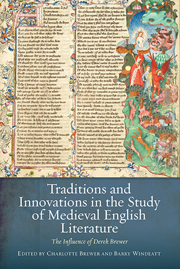 Traditions and Innovations in the Study of Medieval English Literature
Traditions and Innovations in the Study of Medieval English Literature Book contents
- Frontmatter
- Contents
- List of Contributors
- Acknowledgements
- Note on References
- Introduction: A Modern Medievalist's Career
- 1 Derek Brewer: Chaucerian Studies 1953–78
- 2 Brewer's Chaucer and the Knightly Virtues
- 3 Class Distinction and the French of England
- 4 Time in Troilus and Criseyde
- 5 Virtue, Intention and the Mind's Eye in Troilus and Criseyde
- 6 Falling in Love in the Middle Ages
- 7 The Idea of Feminine Beauty in Troilus and Criseyde, or Criseyde's Eyebrow
- 8 ‘Greater Love Hath No Man’: Friendship in Medieval English Romance
- 9 Gowerian Laughter
- 10 Derek Brewer's Romance
- 11 Malory and Late Medieval Arthurian Cycles
- 12 The Ends of Storytelling
- 13 Manuscripts, Facsimiles, Approaches to Editing
- 14 Words and Dictionaries: OED, MED and Chaucer
- 15 Afterlives: The Fabulous History of Venus
- Afterword: Derek Brewer: with ful deuout corage
- Bibliography
- Index
- Tabula in Memoriam
3 - Class Distinction and the French of England
Published online by Cambridge University Press: 05 September 2013
- Frontmatter
- Contents
- List of Contributors
- Acknowledgements
- Note on References
- Introduction: A Modern Medievalist's Career
- 1 Derek Brewer: Chaucerian Studies 1953–78
- 2 Brewer's Chaucer and the Knightly Virtues
- 3 Class Distinction and the French of England
- 4 Time in Troilus and Criseyde
- 5 Virtue, Intention and the Mind's Eye in Troilus and Criseyde
- 6 Falling in Love in the Middle Ages
- 7 The Idea of Feminine Beauty in Troilus and Criseyde, or Criseyde's Eyebrow
- 8 ‘Greater Love Hath No Man’: Friendship in Medieval English Romance
- 9 Gowerian Laughter
- 10 Derek Brewer's Romance
- 11 Malory and Late Medieval Arthurian Cycles
- 12 The Ends of Storytelling
- 13 Manuscripts, Facsimiles, Approaches to Editing
- 14 Words and Dictionaries: OED, MED and Chaucer
- 15 Afterlives: The Fabulous History of Venus
- Afterword: Derek Brewer: with ful deuout corage
- Bibliography
- Index
- Tabula in Memoriam
Summary
There is a long-standing view that French, or Anglo-Norman, was a ‘true vernacular’ in medieval England (Sugget 1946: 79). Johan Vising (1923: 18) made the earliest and broadest claims, insisting that there was a ‘complete dominance of the Anglo-Norman language during the second half of the twelfth and most of the thirteenth century’ as well as a ‘penetration even into the lower strata of society. In this view of literature in England in this period, Anglo-Norman often takes the lead, and English follows not as an alternative, but as a substitute’ (Salter 1988: 33). We are therefore not even studying Middle English adequately if we are not prepared to situate it carefully in the broader territory of Anglo-Norman language and literature. In the last decade there has also been an increasing tendency to insist that the importance of the ‘French of England’ lasted even later than the thirteenth century (‘the composition … of most kinds of French literary texts ceases in England … at the turn of the fifteenth century rather than in the early fourteenth’ [Wogan-Browne 2009: 3]). As Ardis Butterfield (2009: xx–xxi) puts this point, England and France ‘shared a language for four centuries [because] until the 1420s and 1430s, and in some fields such as law for much longer, French in England was the language of jurisdiction, of official and private correspondence, diplomacy, parliamentary petitions, the Privy seal, guild documents, administrative registers, business transactions, the Bible, sermons and moral and devotional treatises, history, biography, satire, romance, lyric, science and medicine’.
- Type
- Chapter
- Information
- Traditions and Innovations in the Study of Medieval English LiteratureThe Influence of Derek Brewer, pp. 48 - 59Publisher: Boydell & BrewerPrint publication year: 2013


